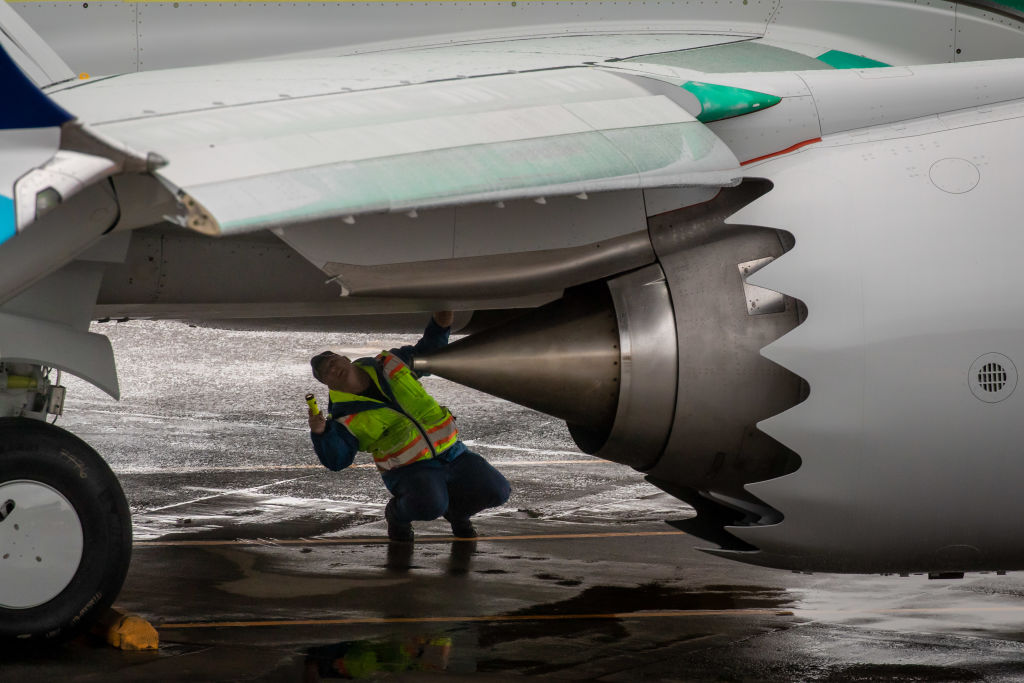Airlines Are Trying to Weaken a New Safety Inspection Rule
The airline industry is lobbying to weaken a new safety rule that would force airlines to address serious flaws in potentially thousands of Boeing planes. They have industry-connected allies in the Trump administration who could help them get their way.

According to a new FAA directive, airlines that fly many of the older generations of Boeing 737 planes must undertake additional inspections, among other safety protocols, after regulators found cracks in several of the planes’ fuselages. (Gary He / Getty Images)
The airline industry is contesting a new safety rule proposed by the Federal Aviation Administration that would force airlines to address serious flaws in potentially thousands of Boeing 737 planes — and they have powerful industry-connected allies in the Trump administration who could help them get their way.
According to the new directive, airlines that fly many of the older generations of Boeing 737 planes must undertake additional inspections, among other safety protocols, after regulators found cracks in several of the planes’ fuselages. Airlines for America, the lobbying group for the country’s major airlines, submitted a public comment last month to weaken the rule, which would require costly maintenance checks.
Transportation secretary Sean Duffy, who now oversees the Federal Aviation Administration (FAA), previously worked as an airline lobbyist on behalf of Partnership for Open and Fair Skies, which represents the major airlines. Airlines for America recently selected the former Republican governor of New Hampshire, Chris Sununu, to be their chief executive officer.
The pending rule, first proposed in July, would revise the inspection standards for Boeing airplanes through a regulatory action called an “airworthiness directive.” These actions are akin to a product recall if inspectors find a defective piece of equipment on the plane, which could range from a malfunctioning air conditioner to a faulty engine — or, in the case of the 737 directive, cracks along the body of the plane’s main cabin. In response to such directives, airlines must first inspect the equipment in question before the plane can take off.
Issuing airworthiness directives is considered a rare and serious move by the Federal Aviation Administration (FAA).
“[Airworthiness directives] are not as common as they should be,” said Bill McGee, senior fellow for aviation and travel at the American Economic Liberties Project. “If FAA issues an airworthiness directive, we can be certain that it was a last resort and the agency gave the company in question every opportunity to fix a particular mess.”
This Boeing airworthiness directive goes further than usual; it doesn’t just call for routine inspections but sets a more rigorous schedule for safety checks to evaluate Boeing planes moving forward.
The directive is a response to recent reports from FAA inspectors who discovered cracks in several Boeing 737 jetliners well before the planes were technically due for maintenance checks. Based on these findings, the FAA has proposed more frequent inspections and tune-ups earlier in the plane’s life cycle to ensure they’re safe to fly.
Boeing, the planes’ manufacturer, submitted a public comment supporting the new rule. But the airline lobby pushed back on the safety standard because airlines flying the planes would primarily bear the cost of the additional inspections.
In its public comment on the proposed airworthiness directive, the airline lobby argues that complying with the rules would “[create] unnecessary burdens for all stakeholders . . . potentially causing aircraft groundings and compliance delays.”
The lobby’s letter also asks regulators to include an “alternative method of compliance,” a carve-out common in other airline safety regulations that effectively allows companies to self-regulate by creating their own alternative standards to comply with the law.
The new directive comes amid heightened scrutiny for Boeing’s aircrafts after two of its newer 737 MAX airplanes crashed in 2019, killing 346 people and leading to a Department of Justice investigation.
Then last year, a fuselage door part flew off a Boeing airplane mid-flight after one of the company’s subcontractors allegedly ignored warnings about defective parts.
“The fact that Boeing has been the subject of recent [airworthiness directives] tells us that Boeing is far from cleaning house and hasn’t fixed its chronic internal quality-control problems,” said McGee.
Airlines for America has historically opposed passenger safety actions on behalf of its clients.
“The industry — including the airlines and suppliers led by Boeing . . . fights and lobbies very hard against any kind of [airworthiness directive] that grounds aircraft or otherwise affects a company’s financial health,” said McGee.
Airlines for America has become particularly emboldened since the Trump administration took office.
In response to a Department of Transportation request for information on deregulation, the lobby sent a ninety-three-page comment letter in May outlining their wish list at the agency. The letter not only demanded a rollback of Biden-era consumer protections for airline travelers but also effectively requested that the Trump administration wipe decades-old regulations off the books. For example, the letter requested that the Department of Transportation eliminate a rule mandating transparent pricing that gets rid of some hidden fees and shutter an agency division that helps consumers compare airlines based on average delays and fees.
“There’s very little legal justification or rationale for these rollbacks. . . . The airlines don’t want to protect passengers and instead blame regulators for their screwups, which is a lesson this admin will learn the hard way,” said a former senior official at the Department of Transportation during the Biden administration who requested anonymity to speak freely.
But the Trump administration has taken steps to implement the industry’s wishes.
In September, the Department of Transportation announced that it would roll back a Biden-era rule expanding a law passed by Congress last year requiring airlines to automatically refund passengers if their flights are canceled or experience extensive delays. The Department of Transportation has also refused to defend in court a Biden-era junk fee rule mandating that airlines disclose all baggage and cancellation fees up front to consumers.